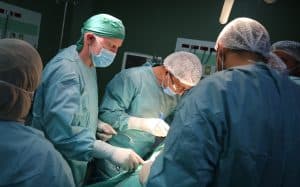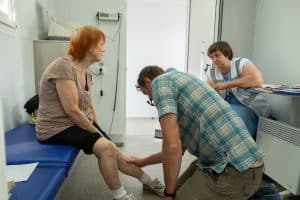What We Do
Everyone should get the healthcare they need when disasters hit. Right now, millions don’t.
Disease outbreaks, the climate emergency, and conflict are hurting millions of people each year. And that number is growing. It’s a global health crisis that affects us all, but it’s the world’s poorest people who suffer the most.
We bring together the best of the NHS, humanitarian and local health expertise – at the worst of times. Learn more about what we do below:
We respond
We respond rapidly to emergencies, delivering the expertise needed to support local health services and save people’s lives.
Sudden onset-disasters take lives, separate families, and devastate communities. When they hit, local healthcare services can be overwhelmed – which is why UK-Med responds to calls for emergency medical assistance from all across the world following crises like disease outbreaks, natural disasters and conflict.
We are a WHO-verified Emergency Medical Team (the only NGO in the UK to have this status) and are the delivery partners for the UK Emergency Medical Team too: the frontline of the UK government’s response to a humanitarian crisis overseas. Drawing from our membership of 1000 global healthcare professionals, we recruit and train teams who are ready to deploy within 24 hours’ notice.
Our work in action

We are providing surgical support, mobile health clinics, and have deployed a field hospital to Gaza.
Our staff have treated thousands of ill and injured people in Gaza since the recent conflict began in October. Our surgical teams at Al Aqsa Hospital – one of the last remaining hospitals in Gaza, work tirelessly alongside local health staff to save lives. Our mobile clinics also provide vital primary healthcare for those unable to access medical assistance. In addition, we have set up a field hospital to receive large numbers of ill and wounded patients.

Our country programme in Ukraine continues to help thousands of people every year.
UK-Med was on the ground immediately after the invasion of Ukraine in 2022. Since then, our emergency response has developed into our first country programme, employing 55 humanitarians to provide vital healthcare in frontline areas. We provide training for local health staff, deploy surgeons to support overburdened hospitals, and deliver mobile clinics to areas close to the frontline.
Learn more about:
- News from our deployments
- Emergency Medical Teams (including the UK EMT)
- Becoming a member of our Register
We prepare
We work with local healthcare staff to strengthen their response skills, enabling health services to be better prepared for emergencies.
When disasters hit, it’s local healthcare staff who are able to respond most quickly to save lives, and will be the ones providing the long-term care that allows people to rebuild their lives.
However, some countries experiencing years of instability or conflict have significant training and investment gaps, and the frequency and scale of some health emergencies will always require international support. We help healthcare staff and organisations to be better prepared for emergencies through training and capacity building; helping to rebuild local healthcare systems and empower staff to respond against outbreaks or disasters.
We learn
We work with academic partners to promote evidence-based practice that improves patient care and the humanitarian sector.
We support and promote research projects focussed on sharing learning from responses and informing policy improvements from across the humanitarian sector.
With roots in the Humanitarian and Conflict Response Institute (University of Manchester), we are firmly nestled within the academic world – both globally and in the UK – and committed to feeding our practical learning into curricula for the current and next generation of humanitarian workers.

